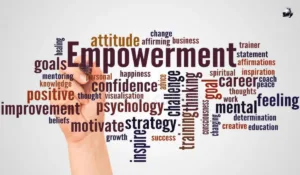Women’s empowerment in Pakistan is essential for equality, economic growth, and social progress, but challenges like discrimination and inequality persist.
The concept of women’s empowerment essentially means that all women should be aware of their rights, as well as their strengths and flaws. It is important for her to understand what she can and should do in this world.
The goal of women’s empowerment is to raise knowledge among all women, particularly among those who lack independence. Additionally, a woman might inspire other women to support women’s empowerment after she achieves success in her life.
The equality of men and women in all spheres of life should be the main point of discussion when discussing women’s empowerment. For instance, if a male offers a woman his seat when she is on public transportation and there are no seats available, she should decline, not use her women’s pass at that moment, and instead stand in the middle of the bus. This was one way to look at it, but women are physically sensitive, so if a guy gives her a seat out of respect, she should take it and sit down while expressing gratitude.
Since men and women are distinct and both deserve their rights, there is actually no comparison between their levels of empowerment. People believe that if women receive education and gain independence, they will become brave, self-centred, and courageous.
People used to oppose women’s empowerment and education because they believed that educated women would not cook for them or that a working woman could not be a housewife. This meant that women who did not receive an education would not be able to work or be independent.
Women make up half of Pakistan’s population. However, males labour far more than women do, which makes it impossible for Pakistan’s economy to function efficiently. Indeed, women’s empowerment is crucial, particularly in Pakistan.
 Women are not empowered if they become independent and, rather than moving on in life, continue to suffer relative to their past. When a woman achieves independence, advances in her life, lives her life as a woman should, and is granted all of her rights, she is really empowered. This is true empowerment for women.
Women are not empowered if they become independent and, rather than moving on in life, continue to suffer relative to their past. When a woman achieves independence, advances in her life, lives her life as a woman should, and is granted all of her rights, she is really empowered. This is true empowerment for women.
Feelings are linked to empowerment as well; a woman should feel powerful. However, this is not empowerment if a woman feels empowered but is actually not autonomous and unable to fully exercise her rights.
A woman who is subjected to torture has accepted her fate and is deprived of the ability to live her life as she pleases. For a culture where women believe that all of these things are their destiny, this is a profoundly depressing position. Awareness of women’s empowerment should be raised by society.
Being financially independent or earning money is not the sole aspect of women’s empowerment. Knowing her abilities and using them effectively are key components of true women’s empowerment. If a woman wants to work or live in her home, she should be free to make her own decisions without external pressure.
We cannot ignore the reality that women in Pakistan lack full autonomy, face harassment at work, and do not receive the same compensation as males. Regardless of their merit, girls will not receive the same compensation as males in Pakistan’s largest corporations.
They must also deal with the issues of marital violence, physical violence, and emotional violence. When considering this issue from a global perspective, Pakistan’s circumstances are dire. Women need to be taught that obtaining their rights is not a favour; rather, it is their right.
The man should be taught that he must share his sister’s, mother’s, wife’s, and daughter’s strengths. Women nowadays are still on their path to progress, but they are also under too much stress.
In businesses, women are positioned in very marginalised roles rather than in positions of decision-making authority. By taking care of three things, we can get over this problem.
First, families can empower women by teaching their boys about it. Teaching family women about their rights and strengths on an individual basis is the second step. Daughters should be educated by their parents in the same manner as sons.
 Women should therefore be treated similarly to males and given the same rights to voice their opinions in the community. Thirdly, women should be able to participate in all state-level choices, including political and economic issues.
Women should therefore be treated similarly to males and given the same rights to voice their opinions in the community. Thirdly, women should be able to participate in all state-level choices, including political and economic issues.


